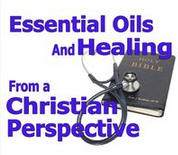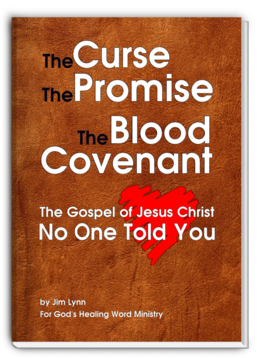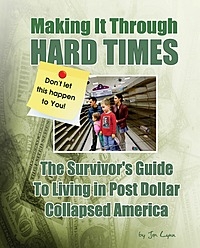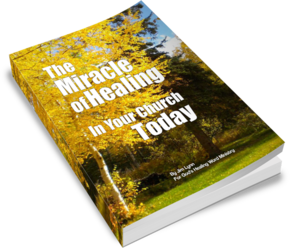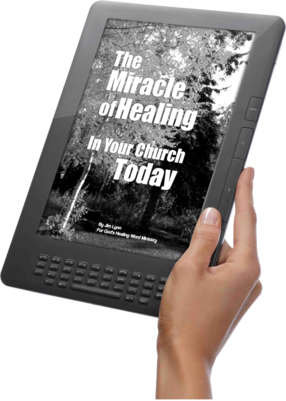
God's perfect will is
not that you be healed, but
rather you never be sick.
The Lord's Supper and
Healing When the Apostle Paul explained the proper manner for believers to observe the Lord's Supper in his letter to the Church at Corinth, he gave us the following teaching:
As a side note: The "body of the Lord" Paul referred to is Jesus' physical, fleshly (soma) body. Then Paul makes an astonishing statement. He scripturally binds the physical well-being of our fleshly body directly to acknowledgment of the fleshly body of Jesus in the Lord's Supper. He writes:
Paul explains why many believers were sick in body. They did not recognize (have faith in) the healing power of the Lord's fleshly (soma) body given to them through the Gospel, to be remembered in the Lord's Supper. Now I did not say that: Paul did! Paul tells the Corinthians there are two realities contained in observance of the Lord's Supper. One is the shedding of Jesus' blood for atonement of sin. The other is the sacrifice of His fleshy body for healing. God has always required the shedding of blood for atonement of sin (Leviticus 17:11; Hebrews 9:22). By the shedding of His life blood, Jesus redeemed us from the curse of the law of sin and death (Romans 8:1-2; Galatians 3:13). That's one reality of the Lord's Supper. Now comes the second reality of the Lord's Supper: The broken body of Jesus is not for the forgiveness of sin, it is for healing to be made possible. For it is through His stripes (His suffering and torment in the flesh) that we are healed today (Isaiah 53:5; I Peter 2:24). In other words, without His body broken, there could be no healing of any kind, ever, (Romans 11:36; Colossians 1:15-18), either before or after the Cross. I believe this is where many Christians lack discernment, both then and now. Throughout his many letters, Paul relates the relationship of our fleshly body to the fleshly body of Jesus Christ as being members of His body (one flesh). It is this same one flesh teaching that joins a man and woman together as husband and wife (I Corinthians 6:13, 12:27; II Corinthians 13:5; Ephesians 5:30-31) Together we make up the Body of Christ (the Church). On a one-on-one basis, our body is part of Christ's body as much as our collective bodies comprise the Body of Christ. Now let me give you my summation of Paul's teaching on why some are sick and have died because of illness. Celebrating the Lord’s Supper can either provide or deny us healing by how we accept or deny the divine healing power of the fleshly, glorified body of Jesus Christ. If we come to the Lord's Supper and partake of the cup and the bread but we deny healing and deliverance as part of the Gospel, we eliminate the provision of God in our lives as a human being apart from salvation and eternal life. For that reason, because we eliminate His broken body as the power for healing, even though we celebrate His fleshly body by eating the bread (and we don’t believe it), we bring judgment unto ourselves. It is for this reason many of us are inflicted with disease and insanity today, because we have said in our heart that it (miraculous, divine, spiritual, providential, or any other name we wish to call God's healing) passed away two thousand years ago; yet we still participate in the Lord's Supper which represents its reality for today. Said another way: Those of us who are sick, while we recognize (have faith in) the blood of Jesus Christ to save our souls, we do not recognize (have faith in) His literal body (soma) to heal our literal (soma) bodies of disease—here—now (Even though our fleshly body is as one flesh with His body). I know for many in the Christian Church that this presents a new teaching which some will struggle with to reconcile. My purpose is to teach God's Word as truthfully and as honestly as I can without prejudice. It is the same for any minister or elder in our number. We do not do so to cause dissension or to be argumentative. The struggle is not so much with God's Word. The struggle lies in our recognizing and accepting what the Word teaches. That is certainly not new, but I mention it here for two reasons: 1. We struggle to fully understand our relationship with 2. We struggle to accept (believe) and receive the
| ||
Share This Website With Church Leaders |
Download These FREE
Special Studies

|
How well you do in the coming collapse, depends on how well you are prepared BEFORE the collapse hits. Making It Through Hard Times tells you what you need to prepare. CLICK HERE for more info. |

The Miracle
Of Healing Today
(New Kindle
Edition)
Words That Bring Healing
My son,
pay attention to what I say; listen closely
to my words. Do not let them out of your
sight, keep them within your heart; for they are life to those who find them and
health to a man's whole body.
- Proverbs
4:20-22
Trust in the LORD with all your heart
and lean not on your own
understanding; in all your ways acknowledge him, and he will make your
paths straight. Do not be wise in your own eyes; fear the LORD and shun evil. This will bring health to your body and
nourishment to your bones.
- Proverbs 3:5-8
Jesus went
through all the towns and villages, teaching
in their synagogues, preaching the
good news of the kingdom and healing every disease and
sickness.
- Matthew 9:35
